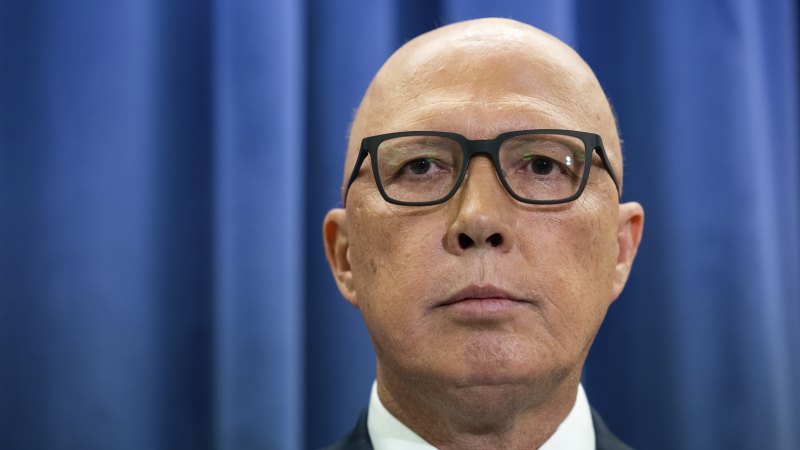How do you solve a problem like Peter Dutton? The hard-headed federal opposition leader who’s apparently holding the Coalition back from the Treasury benches in Victoria. That’s the question keeping Victorian Liberal leader John Pesutto and his colleagues awake at night.
The answer to this question, it seems, is to wait it out and bank on Dutton not leading the federal Liberal Party by the next state election.
“He won’t be our problem in 2026,” one Liberal MP confidently remarked last week. Or as another MP put it, “That’ll all be resolved”.
This strategy, which is widely being relied upon by Liberal MPs nervous about the so-called Dutton factor, relies on opposition MPs rolling their leader ahead of the next federal election or, in a more likely scenario, him leading the federal opposition to defeat and being replaced by someone else.
While this outcome might be likely, as a political tactic, it’s problematic.
Whether it’s because he’s a Queenslander, or his 2018 claim Melburnians were “scared to go out to restaurants” at night because of African street gangs, there is a narrative that Victorians hate Peter Dutton.
Liberal leader John Pesutto turned his back on a commitment to oust controversial Liberal MP Moira Deeming from the party.Credit: Darrian Traynor
Just as the federal opposition tried to heap blame on Pesutto for his handling of the Moira Deeming expulsion ahead of the Aston byelection, it’s convenient for the state team to blame him for their problems.
The problem with the “Dutton is unpopular in Victoria” trope is it ignores the fact that the opposition leader is emblematic of a wider brand problem for the Liberal Party, and thinking the party’s fortunes will turn around once he leaves is a tad naive.
As one former Liberal campaigner quipped: “If they change from Dutton, do they win elections? No. They still have a lack of staff, skills, policies and funds.”
“Is he a beacon for votes in Victoria? Probably not, but the problems run deeper.”
Liberal Party strategists looking to improve the party’s brand believe Dutton’s greatest problem is that he is a reminder of the administration’s past. And he represents many of the negatives associated with Liberal brand – male, hardheaded and a barrier to progress.
To have a chance in 2026, Pesutto knows all too well that banking on Dutton’s demise won’t be enough.
While there is still white-hot anger within the Liberal party room at Pesutto’s fumbling of the attempted expulsion of Deeming, his backers say it set an early benchmark for where he wants to take the party. As one MP said, “In politics you do things for a result or impact, he didn’t get a result, but it has had impact.”
His position on the Indigenous Voice to parliament will be his next test.
Tasmanian Premier Jeremy Rockliff, Australia’s only Liberal premier, has come out supporting the Voice. So too, Western Australia’s opposition leader Shane Love. So far, Pesutto says he has an "open mind" and that his party is engaging sincerely.
Liberal sources say Pesutto is expected to try to resolve the Coalition’s position on the Voice within weeks, with MPs likely to have a free vote should Labor bring on any element for debate in state parliament.
Any move by Pesutto to personally refuse to join Dutton’s “no” campaign, as some say he is prepared to do, would distinguish him from Dutton and potentially help him hold his marginal seat of Hawthorn in 2026.
Pesutto can’t delay any longer if he is going to support the yes vote. To have any political capital, he should have come out early as did Perrottet and Rockliff.
While campaigning vigorously in favour of a constitutionally enshrined Indigenous voice to parliament – when his party room isn’t on board – could further alienate him from a strong conservative bloc and destabilise his leadership, Pesutto seems likely to stick to his commitment and offer a different type of Liberal opposition.
Once the Voice fight is resolved, Liberal insiders predict a debate over energy will be the next policy area where Pesutto takes a different approach to the federal Liberals.
He knows that simply waiting for Dutton to be replaced won’t be enough. In fact, history suggests the Victorian opposition would be better off quietly cheering for Albanese and Labor to remain in power.
For almost five decades the proportion of seats held by state Labor governments increased under the prime ministerships of Fraser, Howard and Abbott.
Similarly, the number of Labor MPs in state parliaments fell when Whitlam was in power, steadily declined in the Hawke-Keating years and hit an all-time low during the Rudd-Gillard-Rudd era.
So, after nine years of Coalition governments in Canberra the new wall-to-wall Labor governments at state level is no surprise, and it may even be one on Pesutto’s biggest assets.
Annika Smethurst is state political editor.
The Opinion newsletter is a weekly wrap of views that will challenge, champion and inform your own. Sign up here.
Most Viewed in National
From our partners
Source: Read Full Article

